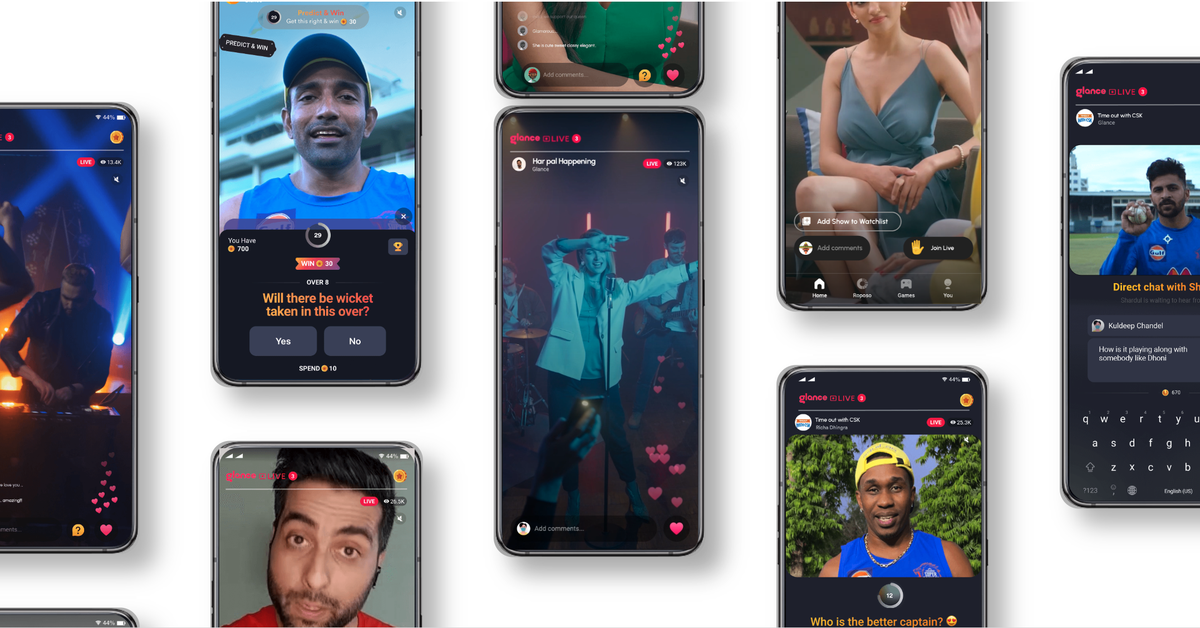Your phone’s lock screen is the hottest new real estate in tech. Apple made the iPhone’s lock screen a centerpiece of iOS 16, giving users more control over how theirs looks and works. But while Apple talked about pretty clock fonts and nifty color-matched wallpapers, it also showed off a world in which your lock screen is more than just a security measure: it’s becoming another surface on which companies can put information, apps, and even ads. Apple’s far from the only company thinking about this, too. TechCrunch reports that Glance, a lock screen content company (which apparently is a thing!) is already in talks with US carriers and plans to launch on some Android phones in the US in the next two months.
The competition for your eyeballs and attention has already come out of apps and onto your home screen, through widgets and notifications. Now it looks like it’s headed one step further: onto the first thing you see when you turn on your phone, before you even pick it up or unlock it. That might be at least one step too far.
If you’ve never seen a Glance-running device before, one way to imagine the app is sort of like a Snapchat Discover feed on your phone’s lock screen. The company serves up a rotating set of news headlines, videos, quizzes, games, and photos that appear every time your phone screen turns on. Glance calls these content cards “glances,” naturally, and says that users consume these glances 65 times a day on average.
:no_upscale()/cdn.vox-cdn.com/uploads/chorus_asset/file/23672584/Screen_Shot_2022_07_05_at_5.23.58_PM.jpg)
And, of course, it’s all filled with ads. Glance is a subsidiary of InMobi Group, an Indian ad tech company. It has partnerships with a number of manufacturers, including Samsung and Xiaomi, and the company says its software is built into more than 400 million phones around Asia. Google is an investor in the company; so is Peter Thiel.
In a certain light, Glance or something like it is a totally sensible idea. You don’t need to constantly dip in and out of apps looking for news and information, you don’t even need to unlock your phone, you just trust your device to bring you something interesting every time you turn it on. And a couple of non-intrusive ads won’t hurt, right? After all, I bought the Kindle with ads on the lock screen to save a few bucks, and it doesn’t bother me. (Though I never would have bought the Prime Exclusive Phones that came with lock screen ads, and apparently neither would anyone else.)
Apple has echoed this idea, talking about how it sees a more feature-rich lock screen as a way to help you use your phone less. Apple’s software chief Craig Federighi referred to the lock screen as “the face of your phone,” and said that features like Live Activities could make it easier to get quick information without having to unlock your phone and open yourself up to all the distractions inside. “If you can get the answer at a glance, then you don’t unlock,” he said, “and once you’ve unlocked your phone, you almost forget why you’re there in the first place!”
:no_upscale()/cdn.vox-cdn.com/uploads/chorus_asset/file/23610784/ios16_widgets.jpg)
:no_upscale()/cdn.vox-cdn.com/uploads/chorus_asset/file/23610784/ios16_widgets.jpg)
:no_upscale()/cdn.vox-cdn.com/uploads/chorus_asset/file/23610784/ios16_widgets.jpg)
:no_upscale()/cdn.vox-cdn.com/uploads/chorus_asset/file/23610784/ios16_widgets.jpg)
But by opening up this space, these companies are offering apps and advertisers a chance to get even closer to you. Developers will surely build Live Activities that stick around long after they’re done being useful, the better to grab you every time your phone lights up. Platforms will find ways to pull more of their content onto lock screens, attempting to hook you into the feed before you even press a button.
Generally speaking, most users don’t change their settings, and you better believe developers will use that to their advantage. “Consumers will move from seeking content to consuming what is shown to them,” InMobi CEO Naveen Tewari told Forbes when Glance launched. That’s super bleak! And probably true!
Most of all, a Glance-like future is a way of turning smartphones even further into consumption-only devices. And is “easier access to endless feeds of medium-interesting content” really a worthwhile goal? As we look to reset our relationship with technology, I would argue we should be finding places to add friction, to give you what you need when you look at your phone… but to also help you realize you didn’t need to look at your phone at all. And if, as Federighi said, the lock screen’s job is to help you avoid distraction, I can’t imagine a worse idea than putting a TikTok-style video feed between you and your home screen.
Glance will surely have competition, but it’s already a good example of where this is all headed. In June, it held Glance Live Fest, a virtual three-day festival that took place entirely on users’ lock screens. It streamed concerts and interactive challenges, live tutorials and interviews, and a ton of live shopping content, to more than 70 million users. It’s like an opt-out music festival, to which you’re transported every time someone sends you a text. That sounds distracting, frustrating, and just flat-out exhausting.
There’s no question that our lock screens could be better. The whole “running list of notifications” thing isn’t great, and a push for more personalization will make a lot of users happy. But that space should belong to users and users only, not turn into yet another breeding ground for distraction and advertising. We should be taking back control of our phones, not giving more of it away.
Credit: Source link



